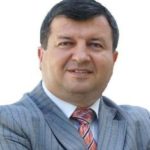South Ossetia, which declared its independence from Georgia unilaterally in 2008, announced that a referendum would be held soon to join Russia. The President of the so-called Republic of South Ossetia, Anatoliy Bibilov, declared that unification with Russia is one of its strategic goals and that steps towards this will be taken as soon as possible.
The first reaction against South Ossetia, whose independence is not recognized by any state other than Russia, came from Georgia. Georgian Foreign Minister David Zalkaliani emphasized that the region was occupied by Russia and said that the referendum statement was unacceptable. There was a signal of support for the referendum from Russia. Andrey Klimov, Deputy Chairman of the Foreign Relations Committee of the Russian Federation Council, stated that there is no legal obstacle to holding the referendum, and that the referendum can be held within 4-5 weeks.
Analyzing the preparations for the referendum in South Ossetia to Ankara Center for Crisis and Policy Studies (ANKASAM), experts said that Russia supports the referendum in South Ossetia.
ANKASAM Eurasia Expert Dr. Sabir Askeroğlu: South Ossetia’s desire to join Russia stems from its security concerns.

Stating that South Ossetia is concerned about security, ANKASAM Eurasia Expert Dr. Sabir Askeroğlu said that the purpose of the referendum was that the people of the region thought that they would feel more secure if they joined Russia.
Askeroğlu reminded that, the referendums were held in the region before, and said that Moscow’s recognition of this referendum, which aims joining Russia, will be reacted harshly by the world.
Referring to the statements coming from Russia regarding the preparations for the referendum, Askeroğlu said, “Klimov stated that the laws allow states to join Russia, and that the people of South Ossetia must declare their will for this. He claimed that there was no obstacle for Russia, they expected when this process would take place, and that Russia resolved the legal issues 20 years ago.”
Ankara University Faculty Member Prof. Toğrul İsmail: The referendum was brought to the agenda at the request of Russia.

Ankara University Faculty Member Prof. Dr. Toğrul İsmayıl expressed that, that kind of explanations by South Ossetia is not new, and referendum issue will be bring on the table by the demand of Russia. İsmayıl has said that “Russia tries to strengthen herself due to the war in Ukraine with the new attack. However, Moscow is having a wrong policy. Georgia did not join the sanctions against Russia, yet after that decision has joined the sanctions and closed her air space.”
İsmayıl, has claimed that a referendum in the South Ossetia would cause a new war, and expressed that “By supporting the referendum here, Russia is opening a new front. Therefore, this would be a casus belli for Georgia, yet since Georgia is not enough for Russia, this war would be a war towards the West. Tbilisi Administration would seek support from North Atlantic Treaty Organization (NATO) and the United States of America (the US).”
Ismail said, “You see Russia, it continues to continue its move in Ukraine against all reactions. Moscow’s support for the referendum in South Ossetia can be interpreted as an intimidation. Other neighboring states will start to feel uncomfortable with this attitude of Russia. A referendum would be a violation of international law and would violate the territorial integrity of neighboring states.” made its assessment.
Retired Ambassador Halil Akıncı: Russia is taking back its old rights. It completes this in a legal way by holding a referendum.

Referring to the autonomous structures in the region, Retired Ambassador Halil Akıncı has said, “After the establishment of the Soviet Union, autonomous regions were created in most of the republics. The peoples of these autonomous regions were also closer to Moscow than the people who gave the republic its name. For example, South Ossetia and Abkhazia within Georgia. These are not in the Tbilisi Government; it was close to Moscow. This is the result of the policy of nationalities. The creation of these autonomous regions means that Moscow can use the peoples of these regions against the people who named the republic when necessary. If the Georgians do not follow Moscow’s orders, then a demonstration will immediately begin in South Ossetia. When Georgia gained its independence after the collapse of the Soviet Union, these two regions emerged by saying that ‘we have the right to be independent like other peoples.’ Karabakh made the same claim. Moscow was also satisfied with this work. Because it was possible to maintain its influence in these regions.” he explained.
Akıncı has reminded that, between 1992-1993 he was the head of Committe of Organization for Security and Co-operation in Europe (OSCE), “In that period we tried to find a middle war, provide the ceasefire, yet we could not end up with a permanent solution. South Ossetia, always positioned towards Moscow. In 2008, South Ossetia also became independent when Georgia was exposed to Russian intervention as it approached the West. Now they want to join Russia. This situation is similar to the developments in Donbass. However, this issue goes back much further, to the years 1991-1992.” he said.
Emphasizing that a referendum to be held in South Ossetia would be just a formality and would provide a legal basis for the process, Akıncı said, “After the collapse of the Soviet Union, Russia behaved like a medium-sized state until Vladimir Putin came to power. However, Russia’s concern is to obtain the status of a great state. Now it sort of takes back its former peoples and thus wants to attain the status of a great state. It completes this in a legal way by holding referendums.” made his comment.
Retired Staff Colonel Ünal Atabay: South Ossetia wants to secure its future by joining Russia.

Pointing to the possibility of South Ossetia’s union with North Ossetia, Retired Staff Colonel Ünal Atabay suggested that the region wanted to join Russia in order to guarantee itself, and then he would raise the issue of unification with North Ossetia. Atabay said, “The membership of Georgia to the European Union (EU) and NATO is being discussed. The question that happened to Ukraine, “Can Georgia also happen?” is asked. I think South Ossetia is making a calculation for the future to save its own situation. There is the idea that ‘If we join Russia when the environment is suitable, we will secure our future’. So instead of staying independent; They see joining Russia as more secure for their future and security.” used the phrases.
Claiming that holding a referendum in South Ossetia would not cause any tension in the region, Atabay said, “There does not seem to be a chance for the peoples of the region to live together in the future. As this is the case, maybe Georgia can reflect this to its internal public opinion, but on the one hand, a part of the problem can be seen as solved. Because Russia has no power to object to its stance. It is obvious what the West has become after supporting Ukraine. The Tbilisi administration sees this too. There is no reason to trust the West right now. Because the West is busy with Ukraine. Therefore, this process will pass silently.” said. Atabay also added that the Moscow administration would look forward to the joining of South Ossetia to Russia.
Journalist Elnur Enveroğlu: Ukraine, South Ossetia and Abkhazia are victims of the same policy.

Journalist Elnur Enveroğlu stated that Russia is trying to regain control of the surrounding regions and said, “The separatist leader, General Anatoly Babilov, is a figure both financed by Russia and brought to power. It is not unusual for him to make such a statement.”
Emphasizing that the reaction of the Georgian Government should be considered, Enveroğlu underlined Russia’s multi-faceted expansionist policy. Enveroğlu said, “Even though Russia seems neutral, it continues to implement its expansionist policy. In Ukraine, there is a similar situation in the Russian-dominated Donbas.” made a statement. Finally, Enveroğlu pointed out that Russia has a 100-year-old political ambition and claimed that Ukraine, South Ossetia, and Abkhazia are victims of the same policy.
